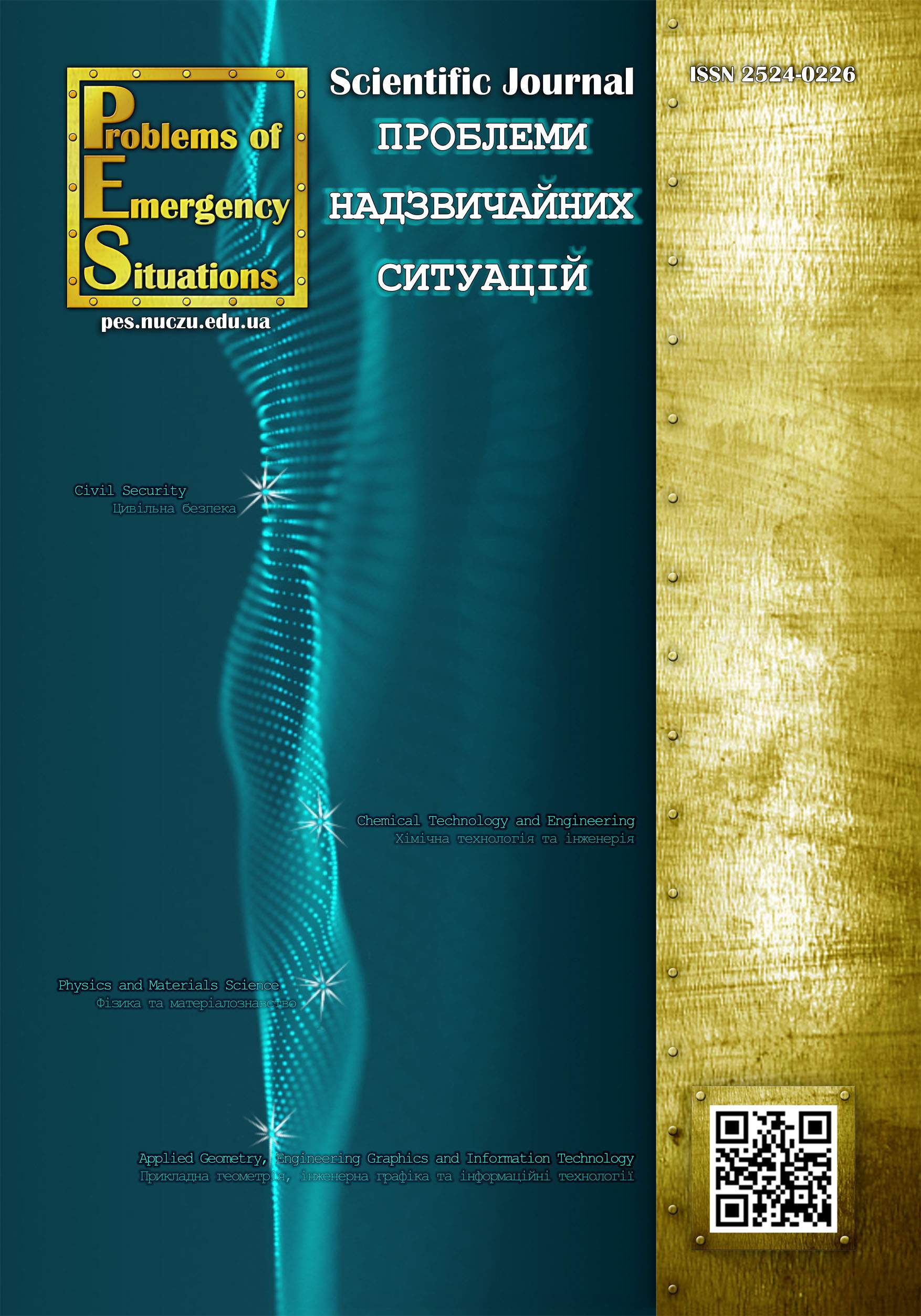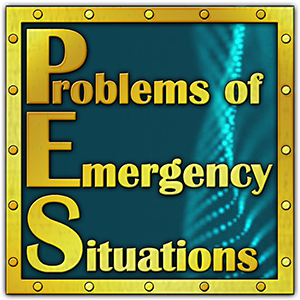Оptimization of the method of assessing the efficiencyof reactive fire protection coatings
Hryhorenko Oleksandr
National University of Civil Defenсe of Ukraine
https://orcid.org/0000-0003-4629-1010
Saienko Natalia
National University of Civil Defenсe of Ukraine
http://orcid.org/0000-0003-4873-5316
Zolkina Yevheniia
National University of Civil Defenсe of Ukraine
https://orcid.org/0000-0003-2562-2546
Lypovyi Volodymyr
National University of Civil Defenсe of Ukraine
https://orcid.org/0000-0002-1967-0720
DOI: https://doi.org/10.52363/2524-0226-2024-39-9
Keywords: effectiveness of fire protection, method, reactive coating, testing, metal fire protection, building constructions
Аnnotation
A critical analysis of methods for assessing the fire-resistant effectiveness of reactive fire-resistant coatings was carried out. It was established that during research aimed at the development of new formulations of flame retardant compounds, it is expedient to use simplified test methods, which would make it possible to significantly simplify the experiment and reduce the time for processing its results. A method of comparative assessment of fire protection efficiency using an electric oven with an isolated test chamber for heat accumulation as a source of thermal radiation, which allows obtaining a temperature on the reverse side of a metal plate above 950 °C, is proposed. As a criterion of fire protection efficiency, it is proposed to use a comparison of the time of reaching the critical temperature (500 °С) on the outside of metal plates protected by fire protection coatings. The effectiveness of fire protection of a metal plate according to the proposed method was investigated for three samples of reactive type fire retardants: a coating based on epoxy oligomer, ammonium polyphosphate, aluminum hydroxide and intercalated graphite, a coating based on styrene-acrylic industrial production and a known coating based on epoxy oligomer filled with ammonium monophosphate and intercalated graphite. It was established that the effectiveness of metal fire protection with a coating based on epoxy oligomer, ammonium polyphosphate, aluminum hydroxide, and intercalated graphite, estimated by comparing the heating time of the metal plate, is 1.3 times higher than the known analog based on epoxy and 1.6 times higher than reactive fire-resistant coating on a styrene-acrylic basis of industrial production, tested under the same conditions. The application of the proposed optimized method allows to provide a comparative assessment of the efficiency of coatings, using as a criterion the time to reach the critical temperature (500 °C) on the reverse side of the metal plate.
References
- Lucherini, A., Maluk, C. (2019). Intumescent coatings used for the fire-safe design of steel structures: A review. Journal of Constructional Steel Research. 162, 105712. doi: 10.1016/j.jcsr.2019.105712
- Gravit, M., Gumenyuk, V., Sychov, M., Nedryshkin, O. (2015). Estimation of the pores dimensions of intumescent coatings for increase the fire resistance of building structures. Procedia engineering, 117, 119–125. doi: 10.1016/j.proeng.2015.08.132
- Novak, S. V., Drizd, V. L., Dobrostan, O. V. (2018). Analiz sucasnih evropejsʹkih metodiv ocinuvanna vognezahisnoji zdatnosti vognezahisnih materialiv dla budivelʹnih konstrukcij. Naukovij visnik: civilʹnij zahist ta pozezna bezpeka, 1(5), 74–85. Available at: https://firesafety.at.ua/Visnyk_new/N1_2018/10_novak_dobrostan.pdf
- Zahist vid pozezi. Vognezahisni pokritta dla budivelʹnih nesucih metalevih konstrukcij. Metod viznacenna vognezahisnoi zdatnosti: DSTU B V.1.1-17:2007 (ENV 13381-4:2002, NEQ). (2007). Kyiv: Minregionbud Ukraini (Last accessed: 19 May 2022). Available at: https://online.budstandart.com/ua/catalog/doc-page.html?id_doc=41506
- Test methods for determining the contribution to the fire resistance of structural members – Part 8: Applied reactive protection to steel members: EN 13381-8:2013. (2013). Brussels: European committee for standardization. Available at: https://standards.
iteh.ai/catalog/standards/cen/df0cdd6b-9ef2-47fc-874b-414ae34aa5cc/en-13381-8-2013 - Boris, O. P., Polovko, A. P., Uzʹkiv, T. B. (2012). Ekspres-metodika ocinuvanna vognezahisnoji zdatnosti vognezahisnih materialiv. Naukovij visnik UkrNDIPB, 2(26), 95–99. Available at: https://firesafety.at.ua/visnyk/2012_No_2-26/15-Boris_Uz_kiv.pdf
- Andronov, V. A., Ribka, E. O. (2012). Porivnanna vognezahisnoji zdatnosti reaktivnih pokrittiv OVK, ENDOTERM 40202 ta ENDOTERM HT-150 za riznih svidkostah nagrivu. Naukovij visnik UkrNDIPB, 2(26), 1–7. Available at: http://repositsc.nuczu.edu.ua/bitstream/123456789/461/1/24.pdf
- Wang, Y., Goransson, U., Holmstedt, G., Omrane, A. (2005). A model for prediction of temperature in steel structure protected by intumescent coating, based on tests in the cone calorimeter. Fire Safety Science, 8, 235–246. Available at: https://www.researchgate.net/profile/Yong-Wang-115/publication/240821850_A_Model_
For_Prediction_Of_Temperature_In_Steel_Structure_Protected_By_Intumescent_Coating_Based_On_Tests_In_The_Cone_Calorimeter/links/5645fe6d08ae9f9c13e72cbf/A-Model-For-Prediction-Of-Temperature-In-Steel-Structure-Protected-By-Intumescent-Coating-Based-On-Tests-In-The-Cone-Calorimeter.pdf - Zahist vid pozezi. Vognezahisne obroblanna budivelʹnih konstrukcij. Zagalʹni vimogi ta metodi kontroluvanna: DSTU-N-P B V.1.1-29:2010. (2011). Kyiv: Ministerstvo regionalʹnogo rozvitku ta budivnictva Ukraini. Available at: https://online.budstandart.com/ua/catalog/doc-page?id_doc=26657
- Silveira, M. R. D., Peres, R. S., Moritz, V. F., Ferreira, C. A. (2019). Intumescent coatings based on tannins for fire protection. Materials Research, 22(2), e20180433. doi: 10.1590/1980-5373-MR-2018-0433
- Hryhorenko, O., Zolkina, Y., Saienko, N. V., Popov, Y. V. (2021). Investigation of the Effect of Fillers on the Properties of the Expanded Coke Layer of Epoxyamine Compositions. In Materials Science Forum, 1038, 539–546. Trans Tech Publications Ltd. doi: 10.4028/www.scientific.net/MSF.1038.539
- Jakovleva, R. A., Fomin, S. L., Safonov, N. A., Bezuglyj, A. M. (2008). Novye ognezasitnye pokrytia po metallu i identifikacia ih teplofiziceskih svojstv. Naukovij visnik budivnictva, 48, 250–268.














